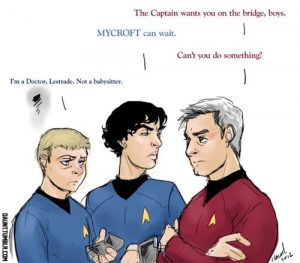We’re all consumers of the same culture here in the big USA. Whether you live in New York City, or on the farms of Nebraska we all watch the same movies, hear the same songs, and read the same books. But how many of us really take it in and become obsessed with it? Geek culture, as in Trekkies/Jedis/Potterheads/etc., definitely does. If you watch a documentary about the conventions that the superfans of these movies attend, you’ll realize why you fell out of your love for Star Trek in the 7th grade–these people are crazy! Most Trekkies have watched all of the episodes and movies, and know the language of the characters, Klingon, and can tell you exactly what every outfit should look like. So, why is it important to be a superfan when it seems dorky and outlandish?
Fan fiction is a way for Star Trekkies, and other sci-fi fan bases, to express themselves. There are many different genres of fanfiction that allows for many opportunities to simply create. Slash fiction takes two characters from the movie, often male, and explicitly illustrates the relationship between the two. This relationship never actually occurs in the movie, but is completely fabricated by the viewers. In Star Trek, the authors of slash fiction describe the intimacy between James T. Kirk and Spock. Although the writers and its audience are mostly female, there has been an increasing number of male viewers. Authors are allowed to do whatever they want with Kirk/Spock, whether it be an extremely pornographic short story or an abstract poem. Within the confines of the stories having something to do with Star Trek, fans are able to invent something completely new.

Conventions, on the other hand, attracts a different kind of fan. While the authors of fanfiction can hide behind a screen and express their devotion anonymously, conventions require you to be present. At these conventions fans dress up as Klingons, Vulcans, Andorians, and all of the other characters in the movie. The meticulous detail that these hand-made costumes have is close to lunacy. Their costumes are exact replicas of the costumes from the original movie down to the stitch. This may seem as though the culture industry has them wrapped around its finger because they’re so invested, but in reality, they often make their costumes their own at these conventions. Geek culture “prompted cross-pollination across geek interests; for example, at the Dragon*Con parade you might find a zombie stormtrooper, mixing Star Wars and Zombie genres” (McCain). Even at these conventions that seem like the people cannot get more culturally brainwashed, you see them making the movies they watched their own.

A common thought is that Star Trekkies are too indulged in culture. According to Henry Jenkins, a professor of Communication, Journalism, and Cinematic Arts at USC, “fans are routinely cast as excessive, over-enthusiastic consumers, too heavily identified with and invested in the media texts they build their fandom around” (Bray). The NBC Saturday Night Live episode called “Get a Life!” expresses the view that “fans don’t have enough critical distance, that they are too immersed, too removed from reality” (Bray). Being removed from reality isn’t always a bad thing. If it means having a mind of your own that doesn’t let everything you watch go right past you, then I want to be removed from reality as well. As weirdas the people at these conventions may seem, their community is one of very few that are able to let their guards down and embrace culture. This community can write fanfiction in their own forms, reflecting their personal tastes and fantasies of the movies we watch so passively.
I’ve been talking a lot about sci-fi movies, and how the fans of this culture are far from passive, but what about the majority of us normal people? Are we passive? On the surface, it may seem so. Yes, there are the Star Trekkies who make their own slash fiction, but the majority of people aren’t a part of this “geek culture”. How many of your friends call themselves a Trekkie, a Potterhead, or anything of that vein? Now, how many of them admit to liking just about any other movie like Ferris Bueller’s Day off or Forrest Gump? I assume most would be on board with the latter simply because a.) they aren’t associated with comic cons and b.) there are so many genres besides sci-fi that people are into. It’s hard to have an incredibly devoted fan culture that Star Trek has with the fan base for Forrest Gump because the consumers of Forrest Gump aren’t dressing up for conventions. This does not mean, though, that they have to be passive because it isn’t a sci-fi movie. If you search, “Forrest Gump fanfiction” on google, hundreds of fanfiction websites will pop up (this works for just about any movie). Even though they aren’t dressing up for conventions, consumers of these other movies are creating their own piece of culture. Mainstream culture provides a medium for self expression, and allows us to xpress how we view any media thrown at us.
But what happens when this culture becomes mainstream? If fans are creating their own form of the culture given to them, isn’t it possible for that form to become the new mainstream culture? Pop culture is, in fact, steered by the tastes of the masses. Take Fifty Shades of Grey for example; this movie was based off of fan fiction from the movie Twilight and is now one of the most popular films. I’m sure this isn’t the only time new movies were made off of fan writing. Even though the consumers aren’t being passive, they are creating the new mainstream. Something about that feels wrong, like we’re being tricked into thinking we’re doing our own thing when we’re actually just creating more of the same.
Catherine Tosenberger mitigates this thought. She, along with other fanfiction writers, wonders why stories like Fifty Shades of Grey are the ones that get their debut when there are so many other stories much better than them. She says that, “many of the best fan stories (as well as many of the mediocre and the worst) are completely unpublishable for reasons that have nothing to do with nebulous assessments of literary quality, and everything to do with the fact that fanfiction is often so deeply embedded within a specific community that it is practically incomprehensible to those who don’t share exactly the same set of references” (Tosenberger). This shows that there is a sort of sacred bubble around fan fiction that cannot be touched that belongs uniquely to the members of that community. Even though there are cases where a story makes it out, for the most part it’s totally their own and can’t be touched.
Popular culture can be constricting, but it can also be freeing at the same time. If you use your creativity to write fanfiction and attend conventions then it gives us a way to be creative. But if we just let it go right through us and keep consuming without making it our own, then it will forever control us. It’s your choice which you want to pick.
References:
Bray, John Patrick. “‘There’s Too Many of Them!’: Off-Off-Broadway’s Performance of Geek Culture.” Theatre Symposium. University of Alabama. Oct 2014.
McCain, Jessica; Gentile, Brittany; Campbell, W Keith. “A Psychological Exploration of Engagement in Geek Culture: e0142200.” Public Library of Science. Nov 2015.
Tosenberger, Catherine. “Mature Poets Steal: Children’s Literature and the Unpublishability of Fanfiction.” Children’s Literature Association Quarterly. Johns Hopkins University. Spring 2014. Page 4-27.